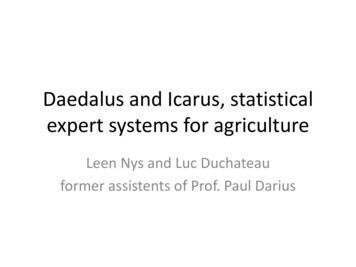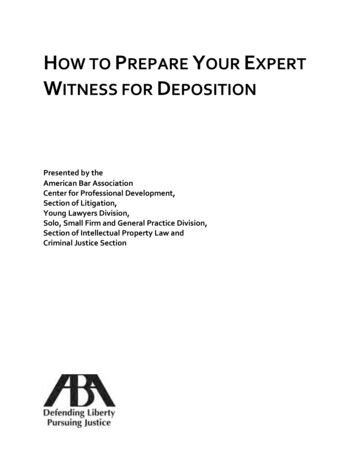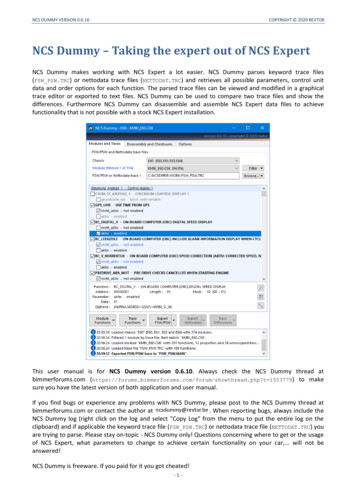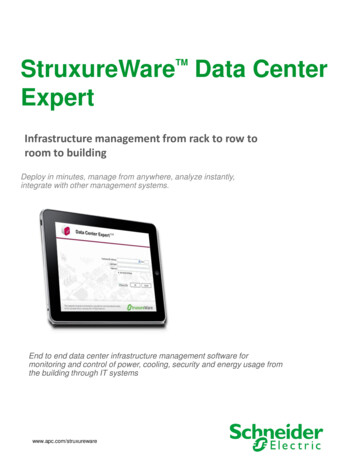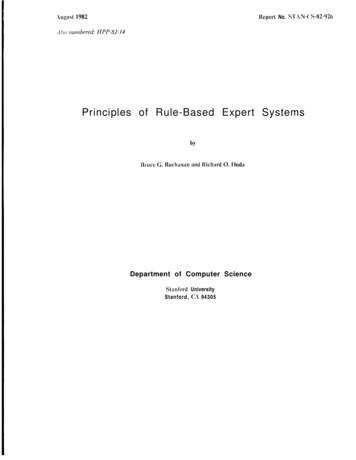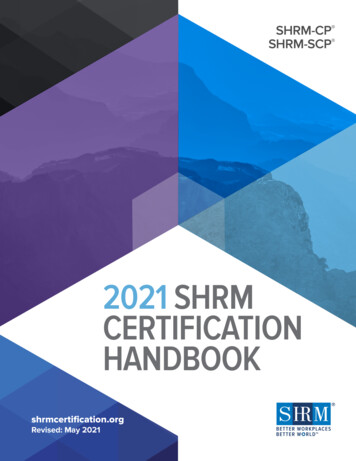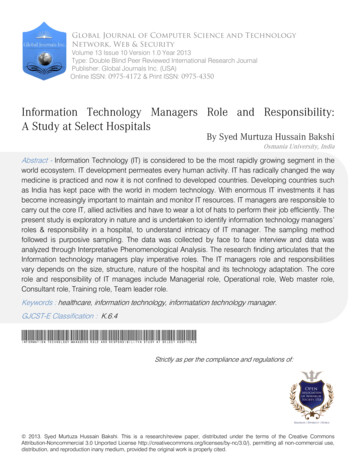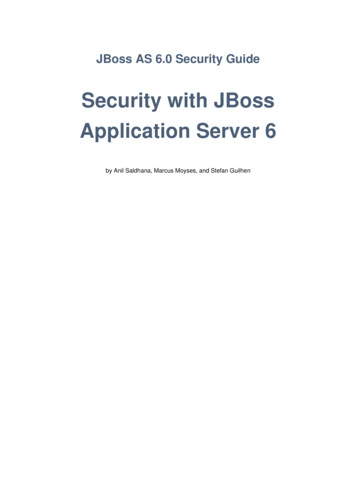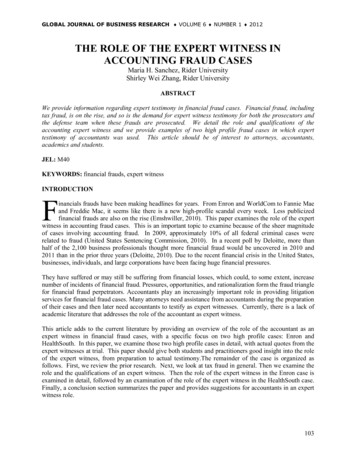
Transcription
GLOBAL JOURNAL OF BUSINESS RESEARCH VOLUME 6 NUMBER 1 2012THE ROLE OF THE EXPERT WITNESS INACCOUNTING FRAUD CASESMaria H. Sanchez, Rider UniversityShirley Wei Zhang, Rider UniversityABSTRACTWe provide information regarding expert testimony in financial fraud cases. Financial fraud, includingtax fraud, is on the rise, and so is the demand for expert witness testimony for both the prosecutors andthe defense team when these frauds are prosecuted. We detail the role and qualifications of theaccounting expert witness and we provide examples of two high profile fraud cases in which experttestimony of accountants was used. This article should be of interest to attorneys, accountants,academics and students.JEL: M40KEYWORDS: financial frauds, expert witnessINTRODUCTIONFinancials frauds have been making headlines for years. From Enron and WorldCom to Fannie Maeand Freddie Mac, it seems like there is a new high-profile scandal every week. Less publicizedfinancial frauds are also on the rise (Emshwiller, 2010). This paper examines the role of the expertwitness in accounting fraud cases. This is an important topic to examine because of the sheer magnitudeof cases involving accounting fraud. In 2009, approximately 10% of all federal criminal cases wererelated to fraud (United States Sentencing Commission, 2010). In a recent poll by Deloitte, more thanhalf of the 2,100 business professionals thought more financial fraud would be uncovered in 2010 and2011 than in the prior three years (Deloitte, 2010). Due to the recent financial crisis in the United States,businesses, individuals, and large corporations have been facing huge financial pressures.They have suffered or may still be suffering from financial losses, which could, to some extent, increasenumber of incidents of financial fraud. Pressures, opportunities, and rationalization form the fraud trianglefor financial fraud perpetrators. Accountants play an increasingly important role in providing litigationservices for financial fraud cases. Many attorneys need assistance from accountants during the preparationof their cases and then later need accountants to testify as expert witnesses. Currently, there is a lack ofacademic literature that addresses the role of the accountant as expert witness.This article adds to the current literature by providing an overview of the role of the accountant as anexpert witness in financial fraud cases, with a specific focus on two high profile cases: Enron andHealthSouth. In this paper, we examine those two high profile cases in detail, with actual quotes from theexpert witnesses at trial. This paper should give both students and practitioners good insight into the roleof the expert witness, from preparation to actual testimony.The remainder of the case is organized asfollows. First, we review the prior research. Next, we look at tax fraud in general. Then we examine therole and the qualifications of an expert witness. Then the role of the expert witness in the Enron case isexamined in detail, followed by an examination of the role of the expert witness in the HealthSouth case.Finally, a conclusion section summarizes the paper and provides suggestions for accountants in an expertwitness role.103
M. H. Sanchez & S. Wei Zhang GJBR Vol. 6 No. 1 2012Prior ResearchThere is little academic research that examines in detail the role of the expert witness in specificaccounting fraud cases. Many case studies examine accounting frauds in detail (e.g., Moriceau, 2005).The frauds at Enron and HealthSouth have been studied extensively. The frauds were widely covered bythe popular press, especially the Wall Street Journal. There are cases on them in numerous textbooks(e.g., Knapp, 2011; Beasley et al., 2009). Most business students study at least one of these cases duringtheir time at the University.Enron is such an important part of accounting history that some faculty use the Enron case during the firstday of all of their accounting classes to capture student interest and let them see that accounting isanything but boring (Stice and Stice, 2006). Enron is one of the most widely cited accounting fraud casesin recent history and is used to teach a variety of business topics, such as special purpose entities (e.g.,Chasteen, 2005), ethics (e.g., Mintz, 2006; Earley and Kelly, 2004), auditor independence (e.g., Roybark,2008), corporate governance (Cunningham and Harris, 2006) and other topics.The HealthSouth case can also be used to teach ethics (e.g., Jennings, 2003; Johnson and Johnson, 2005),corporate governance (e.g., Veasey, 2003) as well as other topics. Part of the popularity of this case inacademia may stem from the fact that the CEO of HealthSouth was the first to be tried under theSarbanes-Oxley Act of 2002.Both Enron and HealthSouth have been studied extensively in the academicliterature as well as the popular press. However, we are unaware of any study that examines the role ofthe expert witness in these cases. This paper contributes to the literature by examining in detail the role ofthe expert witness in these two important cases.Tax FraudAmong the kinds of financial fraud, tax fraud is one of the most common, resulting in billions of dollarslost every year. According to the IRS website, there were between 2,000-3,000 tax fraud investigationsinitiated each year from 2007 to 2010 (IRS, 2011). Such a large number of fraud cases indicate theincreased demand for relevant services offered by accountants. Most often they serve as consultantsbefore trial or as expert witnesses in court.The major phases of litigation are: pleadings, discovery, trial,and possible appeals. During the pleadings phase, the lawsuit is filed and then the defendant files theirresponse. Next, during the discovery phase, written questions and requests for documents are exchanged.After the documents are exchanged, depositions may be taken. Finally, if the case is not settled, it will goto trial. Many cases then go on to appeal. The accountant as expert witness can be invaluable duringboth the discovery and trial phases.In most tax fraud cases, although the defense counsel knows what evidence will be presented at the trial,he or she cannot predict every point that the prosecutor will make. Hence, to prepare for the trial, thedefense counsel should know every detail about the client’s financial records. The defense attorney needsto try to anticipate what will happen in court and mount an affirmative defense for the case. This usuallycannot be accomplished by the attorney alone, because defense attorneys are not often experts in financialmatters. This is where an accountant comes in during the preparation of the case or as an expert witness incourt, which would be crucial to the defense. Therefore, when someone is charged with financial fraudeither civilly or criminally, it is very important for an attorney to work with an accountant who canprovide expert suggestions. The strategy of a defense counsel for a fraud case can depend largely on anaccountant’s evaluation of the case.In the defense of a fraud case, attorneys need to know specifics, because the offense level, which woulddetermine how many years the client could be sentenced, depends largely on the amount of losses. Forexample, in tax fraud cases, according to the Sentencing Guideline Excerpts for Tax Fraud Examination104
GLOBAL JOURNAL OF BUSINESS RESEARCH VOLUME 6 NUMBER 1 2012by University of Houston (2003), the defendant should be sentenced based on their offense level, and theoffense level would be determined by the largest tax loss for tax evasion, the filing of fraudulent taxreturns, and the failure to file returns. In the case of tax evasion or fraudulent returns, the tax loss isconsidered to be the amount of loss that would have resulted if the offense had been successfullycompleted. In the case of failure to file a tax return, the tax loss is considered to be the amount of tax thatwas owed but not paid.When dealing with a fraud case, because of sentencing requirements, an accountant would be needed toexamine the financial records in detail. After examining the details, an accountant should be able to makea judgment as to whether the defendant understated or overstated revenues, or if there are any fictitiousitems, and what is the accurate amount of the fraud. An accountant should also consider the taxperspective on both the federal and state level to see if there is any tax evasion or if any fraudulent taxreturns have been filed, because these acts could raise tax issues after the main prosecution and generatemultiple counts. Since most fraud perpetrators do not pay taxes on the money they steal, there wouldprobably be a multiple counts issue. In addition, attorneys should be aware that it may be easier forprosecutors to file a case on tax crimes when they cannot find sufficient evidence for the mainprosecution.By comparing the accountant’s conclusion and the prosecutor’s indictment, the attorney canmake a decision as to whether or not the prosecution is reasonable, and if he or she should try to settle thecase out of court instead of going to trial. In fact, the majority of tax fraud cases are settled out of court,whether the charges are civil or criminal. On the civil side, attorneys may advise a client to make asettlement in order to avoid the large expense that would be caused by going to trial. On the criminal side,avoiding the trial expenses is also a concern. However, avoiding a criminal record is the most importantreason for out-of-court settlements in criminal cases.Role and Qualifications of the Expert WitnessFor the cases that are not settled, accountants can play another important role in the trial, the role ofexpert witness. Accountants can testify in court regarding the client’s financial matters and give an expertopinion based on their findings. An accountant testifying in federal court must follow the Federal Rules ofCivil Procedure and the Federal Rules of Evidence as well as other federal and state laws. An accountanttestifying in state court must follow the rules in place in that state, some states have their own standards.CPAs also must comply with the AICPA Code of Professional Conduct. Federal Rule of Evidence 702(enacted in 1975 and later updated) deals with the admissibility of expert testimony. Before Rule 702,under the Frye standard, courts generally did not accept expert testimony from accountants (The Fryestandard is no longer used in federal courts, however, it is still used in some state courts.) The Fryestandard requires the judge to consider the opinion of the “expert’s” peers when deciding whether or notthe expert should be allowed to testify. With the enactment of Rule 702, someone with “scientific,technical or otherwise specialized knowledge” could qualify as an expert witness, but it was left toindividual courts to decide if accountants would qualify.However the case of Daubert v. Merrell Dow Pharmaceuticals (509 US 579, 113 SCt 2786, 1993) iscurrently applied by most states. This case gave a checklist of factors for courts to use when assessing thereliability of scientific expert testimony. With this case, the Supreme Court ruled that the testimony ofexpert witnesses must be related closely enough to the issues under trial to aid in their resolution. UnderDaubert, the judge must decide if the expert testimony is both relevant and reliable. It places the court asa “gatekeeper” in evaluating the admissibility of testimony.The Daubert case focused on the admissibility of scientific evidence, and a later case, Kumho Tire Co. vCarmichael (526 US 137, 119 SCt 1167, 1999.) extended this admissibility to include technical and otherspecialized knowledge (i.e., nonscientific). Rule 702 was modified in 2000 to include the standards set bythe Daubert and Kumho cases.Educational, professional and litigation experience are all important for an105
M. H. Sanchez & S. Wei Zhang GJBR Vol. 6 No. 1 2012expert witness (Cendrowski et al. 2007). An expert witness in a fraud case is required by the courts tohave specialized knowledge in the area in which he or she will testify. Testimony should be based onreliable facts and data. The accountant must convince the judge that they are an expert and that theirtestimony is both relevant and reliable. Below are two examples of high profile fraud cases in whichexpert witnesses testified in court.The Enron CaseThe Enron case is probably the most famous fraud case of all time. The Enron scandal resulted in a 1.2billion reduction of owners equity in 2001. A complex business model had allowed dubious accountingpractices to go unquestioned. Enron used hundreds of special purpose entities to keep debt off of itsbooks. The corporate culture was one where executives were focused on short term profits and anincreasing stock price. Enron’s founder and Chairman Kenneth Lay and CEO Jeffrey Skilling wereaccused of misleading investors about Enron’s financial health, including artificially inflating earnings,overvaluing assets, hiding losses, and tapping reserves to meet or beat earnings forecasts. Several expertwitnesses testified in the Enron trial.One expert witness, an accounting professor named Jerry Arnold, testified on behalf of Kenneth Lay.Arnold testified that Enron had followed generally accepted accounting principles on disclosing earningsand losses (Platt a, 2006). When government witnesses testified that Lay and Skilling were “cooking thebooks,” Arnold said that there are different interpretations of accounting rules and “reasonable mindscould differ” and that “there is a lot of judgment involved in reaching a conclusion (Platt, May 2, 2006).He testified that Enron used the “most appropriate way” of disclosing the financial information (Platt,May 2, 2006). Arnold testified that Kenneth Lay’s description of a 1.2 billion reduction in shareholderequity was not misleading because it is immaterial (McWilliams, 2006).Witnesses for the prosecution testified that Enron had overvalued many of their underperforming assets.For example, witnesses contended that an Enron power plant in India which was shut down due topolitical and legal battles with Indian authorities was overvalued by 1 billion. Arnold testified thatEnron was trying to recover the 1 billion through legal action which was still occurring in 2001, so awrite-off was not necessary at that point (Platt, May 2, 2006). Arnold testified that his company wasbeing paid more than 1 million by Lay for expert witness services, of which Arnold had personally beenpaid over 600,000 (Dow Jones International News, May 3, 2006). Arnold testified that he reviewedmore than a million pages of documents, but he said he never talked to former Enron employees oranyone from Arthur Andersen, and that he had only met with Lay for less than one day, and took no notesduring that meeting (Dow Jones International News, May 3, 2006). When the prosecutor implied thatArnold would not have been paid that much “if you have opinions not favorable to Mr. Lay and hislawyers,” Arnold said he found that “in a sense insulting. I don’t get paid to be a puppet. I get paid to usemy expertise to form opinions and judgments” (Dow Jones International News, May 3, 2006).Another expert witness, Walter Rush was hired by Skilling to testify in his criminal trial (Roper, 2006).Rush is a former PricewaterhouseCoopers partner and has also worked at the Securities and ExchangeCommission. Rush testified that last minute changes to accounting records are not unusual or improperand that the accounting reserves created by Enron were proper (McWilliams, 2006). He also testifiedthat, “I went back to take a look and see if anything unusual was going on to manipulate the numbers, andthe answer is no” (Graczyk, 2006). During questioning about whether Enron was hiding 700 million inlosses from its retail energy business by moving the loss to the wholesale division through areorganization, Rush said the accounting was acceptable as long as it was disclosed. When the prosecutorasked Rush whether he grasped the intent of what Enron was doing with that accounting maneuver, Rushanswered, “Intent is not part of the rule” (Roper, 2006). Rush’s testimony also included references tomateriality, noting that many of the disputed amounts were immaterial, in other words, they were too106
GLOBAL JOURNAL OF BUSINESS RESEARCH VOLUME 6 NUMBER 1 2012small to affect Enron’s overall financial picture. He said, “ for us to be talking about 40 million or 14million? is truly immaterial” (Platt b, 2006).Rush was questioned on the stand about the charge that Enron used its reserves like a “cookie jar” toartificially inflate earnings. Rush testified that the reserves had been set up legitimately in 2000 and 2001to protect Enron from volatile energy prices (Roper, 2006). During cross-examination, the prosecutorfound fault with Rush’s methods, noting that Rush had not interviewed Enron’s former accountants andauditors, but had rather only reviewed documents in order to come to his conclusions (Roper, 2006).Skilling was also accused of directing employees to bump earnings per share from 30 cents to 31 cents in2000. Employees from the Investor Relations department at Enron testified early in the trial that Enronexecutives made or knew of overnight changes to earnings estimates that were made to meet or beatanalyst expectations. Rush testified that he had reviewed documents and found nothing wrong, and thatduring financial reporting, “there are changes going on up to the very last second. It is universal. Everycompany goes through this” (Graczyk, 2006).Rush testified that he was being paid 600 per hour by the defendants for his services, totaling 570,000.He testified that he is objective and had also been retained by the U.S. Department of Justice and otherfederal agencies for about a dozen investigations and financial reviews (Platt a, 2006).In the end, thetestimony of the expert witnesses was not enough. Lay was convicted of 10 counts in 2006, and couldhave faced 20-30 years in prison. However, Lay passed away before his sentencing and a judge thenvacated his conviction. Skilling was convicted in 2006 of multiple charges and is serving his sentence.In 2010, on appeal, the Supreme Court vacated part of Skilling’s conviction and sent part of the case backto the lower court.Numerous Enron executives pleaded guilty or were convicted for their roles in thescandal. A federal jury convicted Enron’s auditing firm Arthur Andersen of obstruction of justice, whicheffectively caused Arthur Andersen to go out of business. The conviction was later overturned. In thewake of the Enron scandal, congress passed the Sarbanes-Oxley Act of 2002 to help deter financialstatement fraud and prosecute those who engage in it. Below, the HealthSouth case is discussed. TheCEO of HealthSouth was the first to be tried under the Sarbanes-Oxley Act.The Healthsouth CaseThe HealthSouth case is interesting because of the enormity of the fraud and the use of accounting expertwitnesses by both the prosecution and the defense. In the 2.7 billion HealthSouth scandal of 2003, CEORichard Scrushy was charged with fraud, money laundering, false corporate reporting, obstruction ofjustice, racketeering, bribery and other charges. Scrushy was the first CEO to face trial under theSarbanes-Oxley Act of 2002. After the fraud was discovered, HealthSouth’s Board of Directors hired aforensic accounting team from PricewaterhouseCoopers to uncover the extent of the fraud. During thetrial, one of the investigators, Harvey Kelly, testified that during the 23,000 hour fraud investigation, heand the other investigators had sorted through millions of documents (Shmukler, February 1, 2005). Hetestified that he and others interviewed more than 200 people and visited HealthSouth facilitiesthroughout the country, but they found few emails to work with because HealthSouth’s system deletedold emails every 60 days (Morse and Shmukler, 2005). The witness testified as to how the financedepartment employees “cooked the books,” noting that 80% of the fraudulent income entries related tofake numbers being dumped into “contractual adjustments” (Morse and Shmukler, 2005). Kelly used flatscreen video monitors in the courtroom to help show how the fraud was orchestrated. HealthSouth’s fieldunits would send their correct figures to corporate headquarters, then finance department employeeswould change the numbers to increase net income. Kelly said, “that’s where they cooked the books they just made up the numbers” (Morse and Shmukler, 2005). Kelly testified that he was paid 700 perhour by the government for his expert testimony (Shmukler, February 1, 2005).107
M. H. Sanchez & S. Wei Zhang GJBR Vol. 6 No. 1 2012Later in the trial, the prosecution used another expert witness, William Bavis, a money laundering expert,to testify against Scrushy. The prosecution argued that Scrushy laundered the profits from the fraud bybuying very expensive luxury items. Bavis testified that Scrushy received millions of dollars in bonusesfor meeting financial targets in HealthSouth’s business plan and under bonus plans for management(Associated Press, LA Times April 13, 2005). The expert witness and his team of accountants analyzedmore than 34,000 transactions while reviewing Scrushy’s accounts (Associated Press Chicago TribuneApril 16, 2005). Bavis testified that Scrushy would not have been eligible for the bonuses without thefraud and that Scrushy made 163 million in profits from stock options (Associated Press, LA TimesApril 13, 2005). The expert detailed, along with photographs, some of Scrushy’s lavish purchasesincluding a nearly 329,000 Rolls Royce, a 428,000 ring for his wife, and paintings by Picasso, Chagall,Renior and Miro.Scrushy’s defense team argued that Scrushy’s subordinates at the company hadconducted an elaborate accounting fraud which they kept secret from Scrushy.A forensic accountant used as an expert witness by the defense team, Tim Renjilian, testified thatHealthSouth was so big and complex that Scrushy was not able to detect the fraud. Renjilian testified thatthe company had more than 2,500 bank accounts and 378 million in fake cash on its books and that the15 people who pleaded guilty to participating in the fraud had years of experience in banking and workingwith the external auditors. He argued that the fraud was concealed from Scrushy, saying “You’ve got agroup of folks involved in the fraud who I think could have overcome the world’s greatest internalcontrols” (Reeves, May 6, 2005). Renjilian also testified that the government’s expert witness used“accounting fictions” when trying to show that Scrushy used money from the fraud to make lavishpurchases (Reeves, May 6, 2005). This accounting expert testified that Scrushy’s stock options had valuebefore the fraud, implying that Scrushy would have a lot to lose by participating in the fraud (Reeves,May 9,2005).Renjilian testified that his firm was paid 1.2 million by the defense (Reeves, May 6, 2005).Another expert witness for the defense, Wayne Guay, testified that Scrushy’s compensation was in linewith CEOs of other companies. Guay also testified that Scrushy was entitled to the multimillion dollarcompensation packages and that there was nothing wrong with Scrushy selling stock and exercising hisstock options (Reeves, May 12, 2005).Scrushy was acquitted in 2005 on criminal charges of directing anaccounting fraud. In 2009, Scrushy was convicted on civil charges and ordered to pay 2.8 billion indamages.CONCLUSIONThe goal of this paper was to examine the role of the expert witness in accounting fraud cases. This paperlooked at two accounting frauds in detail, Enron and HealthSouth. This is an important topic because inthese weak economic times, financial frauds may continue to rise. Considering the definite accountingand financial matters involved in financial fraud cases, and in order to have a better performance indefending clients who were accused by committing fraud, the demand for accountants, especially CPAs,who can assist attorneys and/or act as expert witnesses, will likely be strong. This paper explored taxfraud, the role and qualifications of an expert witness, and then the two cases in detail.Recommendations for expert witnesses include, in addition to appropriate technical knowledge, someonewho testifies well and is credible and likeable to juries (Coenen, 2007). Accountants should also keepthemselves in a continuing learning process, for example, being more familiar with the relevant code andsentencing guidelines, in order to give attorneys analytical suggestions based on their expert knowledge.This paper looked in detail at two high profile cases, Enron and HealthSouth. The role of the expertwitness was very important in these newsworthy cases and expert witnesses were used by both theprosecution and the defense. Expert witnesses were used to testify about accounting treatments as well ascompensation issues. A limitation of this paper is that we only examined two cases in detail. Expert108
GLOBAL JOURNAL OF BUSINESS RESEARCH VOLUME 6 NUMBER 1 2012witnesses are used in a large amount of cases. Future research in can examine other accounting fraudcases in detail.REFERENCESAssociated Press (2005) “HealthSouth Corp.: Scrushy’s Lawyers Bash Fraud Analysis,” Chicago Tribune,April 16, p. B2Associated Press (2005) “Scrushy Perjury Case Gutted,” Los Angeles Times, April 13Beasley, Mark A., Frank A. Buckless, Steven M. Glover, and Douglas F. Prawitt (2009) Auditing Cases:An Interactive Learning Approach, 4th ed., Upper Saddle River, NJ: Prentice Hall.Cendrowski, Harry, James P. Martin and Louis W. Petro (2007) The Handbook of Fraud Deterrence,Hoboken, NJ: John Wiley and SonsCoenen, T. L. (2007) “Expert Witness Testimony,” Fraud Magazine, vol. 21(2): 24-26Cunningham,Gary M. and Jean E. Harris (2006) “Enron and Arthur Andersen: The Case of the Crooked Eand the Fallen A,” Global Perspectives on Accounting Education, vol. 3, p. 27-48Deloitte. (2010), April 27. “Deloitte Poll: Majority Expect More Financial Statement Fraud Uncovered in2010, 2011 Compared to the Last Three Years”http://www.deloitte.com/view/en 4de38210VgnVCM200000bb42f00aRCRD.htmDow Jones International News (2006), May 3. “Accountant Testifies Enron’s Lay Didn’t MisleadInvestors.”Earley, Christine E. and Patrick T. Kelly (2004) “A Note on Ethics Educational Interventions in anUndergraduate Auditing Course: Is There an "Enron Effect"?,” Issues in Accounting Education, vol. 19(1)p. 53-72Emshwiller, John (2010) “Tough Times Breed Financial Cons,” The Wall Street Journal, December 27, p.A3Figlewicz, Raymond E, and Hans-Dieter Sprohge (2002) “The CPA’s Expert Witness Role in LitigationServices: A Maze of Legal and Accounting Standards,” Ohio CPA Journal, July-September, p. 33-38Fink, Robert S. (1976) “The Role of the Accountant in a Tax Fraud Case,” The Journal of Accountancy,April, p. 42-48.Flynn, George (2006) “Defense Witness says Enron Accounting Practices were Legitimate,” PlattsCommodity News, May 3Flynn, George (2006) “Witness says Enron’s Consolidation of Retail Losses was Justified,” PlattsCommodity News, May 3Graczyk, Michael (2006) “Defense Accountants say Enron Financial Reporting Correct,” AssociatedPress Newswires, May 3109
M. H. Sanchez & S. Wei Zhang GJBR Vol. 6 No. 1 2012Hoyt, Richard W. (2008) “Daubert and the Appraisal Expert Witness Revisited,” The Appraisal Journal,Spring, p. 168-178IRS (2011) “Enforcement Statistics – Criminal Investigation Enforcement ent/article/0,,id 108792,00.htmlJennings, Marianne M. (2003) “The ethics lessons of HealthSouth,” Corporate Finance Review, 8(1) p.44-48Johnson, Mary Virginia Moore and Gary G. Johnson (2005) “CEOs 1, SOX O: The Case Against RichardScrushy and Healthsouth,” Journal of Legal, Ethical and Regulatory Issues, vol. 8(1) p. 35-42.Knapp, Michael C. (2011) Contemporary Auditing: Real Issues and Cases, 8th ed., Mason, OH: SouthWesternMcWilliams, Gary (2006) “Executives on Trial: Defense Consultants Testify Enron Books Were Sound,”The Wall Street Journal, May 4, p. C3Mintz, Steven. (2006) “Accounting ethics education: Integrating reflective learning and virtue ethics,”Journal of Accounting Education, vol. 24(2), p. 97-117Moriceau, Jean-Luc (2005) “What can we learn from a singular case like Enron?,” Critical Perspectiveson Accounting, vol. 16(6), p. 787Morse, Dan and Evelina Shmukler (2005) “Accounting Expert: HealthSouth Purged E-Mail Frequently,”Dow Jones Business News, January 28, online editionPlatts Commodity News (2006), May 2. “Enron Applied Accounting Laws Correctly to 2001 Losses:Witness.”Reeves, Jay (2005) “Defense expert: HealthSouth Fraud too Complex for Detection,” Associated PressNewswires, May 6, online editionReeves, J. (2005) “Defense Rests Without Scrushy Taking the Stand,” The Decatur Daily, May 12, onlineeditionReeves, Jay (2005) “Witness: Scrushy had Most to Gain in Fraud,” Associated Press Newswires, May 9,online editionRoper, John (2006) “The Enron Trial: Company Officials Acted in Good Faith, not Greed, AccountingExpert Testifies,” Houston Chronicle, May 4, p. D1Roybark, Helen M. (2008) “Educational interventions for teaching the new auditor independence rules,”Journal of Accounting Education, vol. 26(1): p. 1-29“Sentencing Guideline Excerpts for Tax Fraud Examination.” University of Houston, 30 Apr. 2003Shmukler, Evelina (2005) “Executives on Trial: Scrushy Team Cross-Examines Forensic-AccountingWitness,” The Wall Street Journal, February 1, p. C4110
GLOBAL JOURNAL OF BUSINESS RESEARCH VOLUME 6 NUMBER 1 2012Stice, Earl K. and James D. Stice (2006) “Motivation on Day One: The Use of Enron to Capture StudentInterest,” Journal of Accounting Education, vol. 24(2): p. 85-96
The accountant as expert witness can be invaluable during both the discovery and trial phases. In most tax fraud cases, although the defense counsel knows what evidence will be presented at the trial, he or she cannot predict every point that the prosecutor will make. Hence, to prepare for the trial, the



